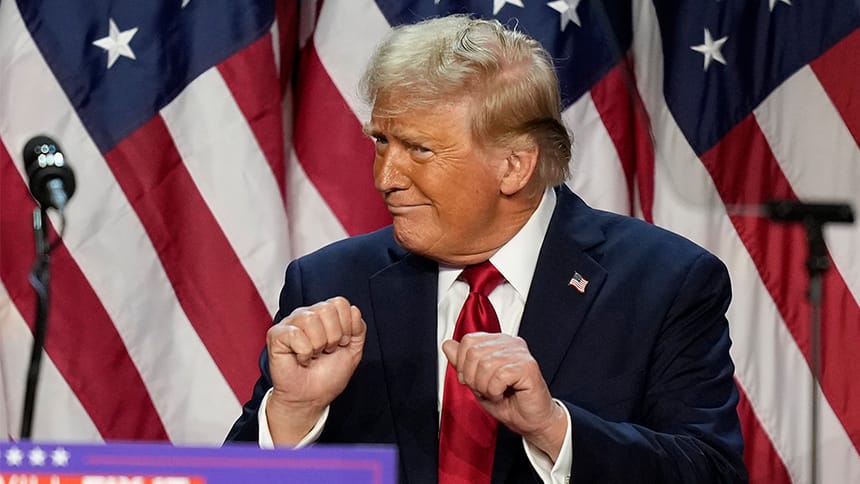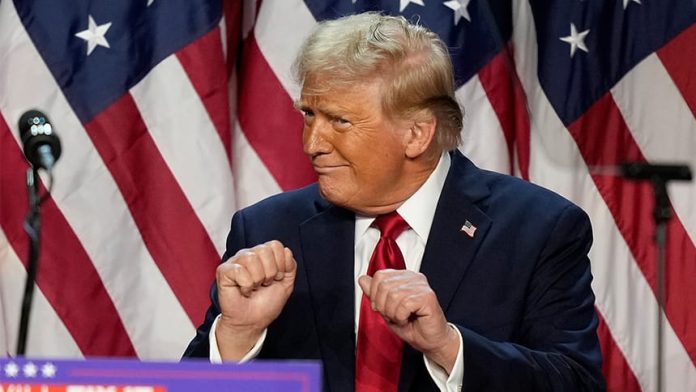In a stunning political turnaround, former President Donald Trump has emerged victorious in the 2024 U.S. presidential election, marking his return to power after a four-year hiatus. This victory has reshaped the political landscape, with wide-ranging implications for both domestic and international affairs.
Trump’s campaign resonated with a large segment of the American electorate, with his promises of economic revival, strong border security, and a tougher stance on foreign policy gaining significant traction. Despite facing multiple legal challenges and significant opposition from the Democratic Party, Trump managed to galvanize his base, securing key battleground states that were pivotal in his path to victory.
Trump’s success in the election is seen as a reflection of a polarized nation. His rhetoric and policies continue to appeal to a broad swath of conservative Americans who are dissatisfied with the current administration’s handling of issues such as immigration, national security, and economic stability. With the Democratic Party struggling to unify behind a single candidate, Trump capitalized on his ability to maintain strong support from his core group of voters, despite ongoing controversies.
The victory is especially noteworthy given the turbulent political climate in the United States. His first term in office was marked by fierce partisan divisions, and many believed his political influence had waned after his 2020 defeat. However, Trump’s electoral comeback suggests a reinvigoration of his political brand, with his populist message resonating more than ever in certain pockets of the country.
International reactions have been swift. World leaders, especially those from countries with significant diplomatic ties to the United States, have already begun to weigh in. In a show of solidarity, Indian Prime Minister Narendra Modi was among the first to congratulate Trump on his win, calling it a historic victory. Modi expressed optimism for continued strong relations between the U.S. and India under Trump’s leadership, a sentiment echoed by many in Washington who see Trump’s foreign policy as aligning with their own strategic goals.
Trump’s return to office is expected to bring a shift in U.S. foreign policy, particularly in areas like trade, defense, and global diplomacy. His “America First” agenda, which emphasizes prioritizing American interests, is likely to influence U.S. interactions with global powers such as China, Russia, and the European Union. Trump’s previous administration saw tense relations with China, particularly over trade disputes and intellectual property concerns, and experts predict this will remain a significant issue if he continues in the same vein during his second term.

Domestically, Trump’s policies on immigration, taxation, and government regulation are anticipated to dominate the early days of his presidency. The reversal of many policies put in place by the Biden administration will likely be a priority, especially on issues like energy production, healthcare, and job creation. The Republicans, buoyed by Trump’s win, are also expected to strengthen their hold on Congress, further influencing legislative agendas for the coming years.
While some continue to voice concerns about Trump’s divisive approach to governance, many supporters argue that his no-nonsense leadership style is just what the country needs to navigate its challenges. As the nation looks ahead, questions remain about the lasting impact of his return to power, especially in terms of the ideological polarization that has defined much of his political career.
As Donald Trump prepares to take office once again, the world watches with anticipation. His victory marks not just a political milestone for him personally but a seismic shift in the trajectory of American politics. The full implications of his second term will unfold in the coming months, but one thing is clear: Trump’s comeback is not just a political victory, but a defining moment in U.S. history.



